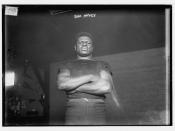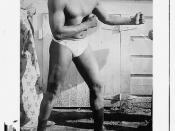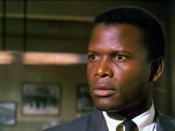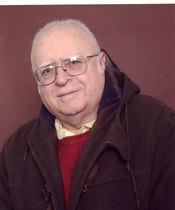Main Characters:
Sam Wood is the protagonist in the story because the story starts off with him driving around Wells, and he was the one who discovered Mr. Mantoli's body. On page two, it says, "He slipped the car into gear and moved it away from the curb with the professional smoothness of an expert driver." This quote shows how Sam is an expert driver. Another quote on page thirty nine, "Sam reached up and removed his uniform cap ashamed that he had forgotten to do so until now. I'm terribly sorry to have to bring you this news." This quote describes how Sam is a sensitive person internally. In addition, Sam Wood hates to be called Sam and rather be called Mr. Wood. Sam has been a police officer for three years, (pg.2) and is a night patrol cop. He wears a police uniform that has the number 38 on it.
(pg.7) Sam in a cautious person because when driving, he concentrates on missing holes in the road! (pg.3) Sam has powerful feelings for Duena. On page 57, it says, "He wanted desperately to offer her his protection, to let her cry on his ample shoulder if she wanted to, to hold her hand in a reassuring grip." Sam also starts to develop a relationship with Virgil because he knows he is helping them solve the murder case, so he decides to offer him food. Sam's conflict internally is about racism. He was extremely racist to blacks at first. For example, he called them "animals" on page five. Also, he arrested the Negro without questioning in the railroad station, assuming that he was the one of murdered Mr. Mantoli on page 15. Later on in the book, he overcomes his conflict and realizes that black people are normal people because he has been working with Virgil (a Negro) during the whole investigation. Moreover, he shook hands with Virgil. Sam's conflict externally is to find the person who killed Mr. Mantoli because he has strong feelings for Duena and wants to help her find the murderer of her father. Sam is round because he is strict and follows orders, but he has his own opinions. Sam is also dynamic because he changes his views on Virgil, which he undergoes a significant change in the book. Lastly, Sam is a realistic character because he shows many human characteristics.
Virgil Tibbs is a Negro homicide investigator (pg.25) from Pasadena, California. (pg.19) He works for the Pasadena Police Department for ten years, on page 25, and is very educated. (pg.18) He wanted to visit his mother, but Sam was thoroughly questioning Virgil in the railroad station, and this incident made Virgil help the Pasadena Police Department in solving their case. On page 14, it says, "He is fairly slender and dressed up in city clothes, including a white shirt and a tie. Sam guessed that he might be about thirty, but it was always hard to tell about blacks." Obviously, this quote describes Virgil's physical appearance. On page 15, it says, "Virgil has a broad nose, but it looked like a white man's nose, thick heavy lips, and the line of his mouth was straight and disciplined." This quote describes Virgil's facial features. Another quote which describes his appearance on page 16 says, "Sam guessed that the suspect was around a hundred and fifty pounds, maybe a little more, but not so much. He was about five feet nine, large enough to have done the job. He did not have the big butt Sam was accustomed to on many Negroes." Virgil is very polite and gentlemen like because on page 28, he says, "Excuse me." He is also calm and confident on the decisions and judgments he makes. For example, on page 176, he advises Sam to be a sergeant. Virgil's conflict internally is to live with the racists' people in the city of Wells. Though he does not show it, inside he obviously does not like how people are prejudice towards him. Virgil's conflict externally, is to solve the murder case and to find the murderer of Mr. Mantoli. In the beginning, Virgil does not have a strong relationship with anybody because he was accused of killing Mr. Mantoli. Later on, he starts to have a strong relationship with the Endicotts because they were not racists. Also, he starts to develop a relationship with Sam because he has been working with Sam most of the time and Sam offered him food. Virgil Tibbs could be described as a secondary protagonist. Virgil is round because he has many sides to his nature. He is static because he does not change or grow and is the same sort of person throughout the story. And he is realistic because he shows many human characteristics.
Bill Gillespie is the chief of police in the city of Wells (pg.10) and has only been chief and a Wells resident for only nine weeks. (pg.11) Bill is six feet four and the author gives us the idea that he is a big, tough, confident, and determined character. For example, on page 11, it says "His forcefulness cost him the girl he wanted to marry, and swept away many obstacles as though they had never existed." Bill Gillespie had abundant confidence in his own ability to meet whatever challenges thrown at him; despite he was only thirty-two. (pg.11) He gets annoyed when people tell him what to do. (pg.13) Bill is educated because he went to a police school in Texas. (pg.11) Bill is quick to make decisions and he does not like to admit his mistakes. He is bad tempered, demanding and rude. On page 27, it says, "He shaved, put some deodorant under his armpits in lieu of a shower, rebrushed his hair, and drove back through the morning traffic to the police station." This quote shows that he is aware of his physical presentation. His internal conflict is being extremely racist to black people. Later in the book, he slowly overcomes by working with Virgil and shaking hands with him. His external conflict is to solve the murder case because he has to prove to the citizens of Wells that he is worthy of being chief of police. Bill has a bad relationship with Virgil because he dislikes black people. When he got the call from Frank Schubert, he started to quit being racist to Virgil because Frank told Bill what help Virgil would be in solving the case and also it would help prevent Bill from losing his job. After that call, Bill slowly develops a stronger relationship with Virgil knowing how much Virgil means to him, he even shook hands with Virgil. Bill Gillespie is a supporting character in the book. Bill is round because he has many sides to his nature. Bill is dynamic because he changes his views on Virgil, which he undergoes a significant change in the book. Lastly, Bill is realistic because he shows many human characteristics.
Minor Characters:
Delores Purdy is an exhibitionist who likes to show off her body. Strangely, she feels her body enchanting on page 152. She has been deprived of social acceptance, and believes she can overcome this handicap by sensational conduct, irresistible to males, which is stated on page 152. She even displayed herself to Harvey Oberst without him asking! She is one of the antagonists in the story because she accused Sam of seducing her, which caused the main character, Sam, to go to jail. Delores believed that she was pregnant, so she accused Sam because he stopped by her house daily. Secondly, he was not married. Lastly, she was attracted to him, so she reveals herself to him. (pg.153) On page 151, Virgil says, "Delores Purdy is eighteen years old; she passes for sixteen so she will not be scoffed at school for being two grades behind the point where she should be." This quote shows how her and her family background is lacking intellectual level and education, which are both below average. Delores is one of those people who are extremely racist to black people. For example, on page 137, she says, "Niggers go to the back door." Another on page 155, she says, "I ain't gonna talk with no nigger in the room." These two quotes explain how she is racist and the second quote proves that she lacks education by the way she talks. Delores lives in a poor white neighborhood in Wells and she always seemed unwashed or unclean. (pg.3) She is important to the work because she was the reason for the murder and she accused Sam of seducing her, which is important because it caused another conflict to occur and it had to be solved. Delores Purdy is a flat character because she is a limited character with a couple of traits. She is also a static character because she does not change her views on Virgil; therefore, her views on blacks do not undergo a significant change. Lastly, she is a stereotypical slut.
Ralph is one of the antagonists in the story because he killed Mr. Mantoli with a block of wood. Ralph did not want to kill Mr. Mantoli; he just wanted to stun him so he can take Mr. Mantoli's money. He was charged for an assault with a deadly weapon and manslaughter, but it is not first degree murder because it was an accident. (pg.182) Ralph is important to the work because he killed Mr. Mantoli and basically created this whole dilemma. Ralph is smart and tricky to have planned the murder situation. He put the body in the middle of a highway with the wallet near Mantoli because the cops would thought it was a hit-and-run situation, or the cops would have thought somebody killed him for his money. He even blamed the innocent Gottschalk for murdering Mr. Mantoli. It also took a professional homicide investigator quite a long time until he could figure it out, considering he is only nineteen years old. Ralph is a night counterman (diner guy) for a restaurant. On page four, it says, "His sharp, bony face still showed signs of acne, and his lower lip hung slightly open." This quote describes his physical appearance. Ralph is racist against black people because on page five, he says, "They don't feel it when they get hit the way you or I would. They haven't got the same nervous system." Ralph is unschooled (pg.177), has a limited mind, and it not too reliable. (pg.74) Ralph is much like Delores. He is flat, static, and a stereotypical character.





